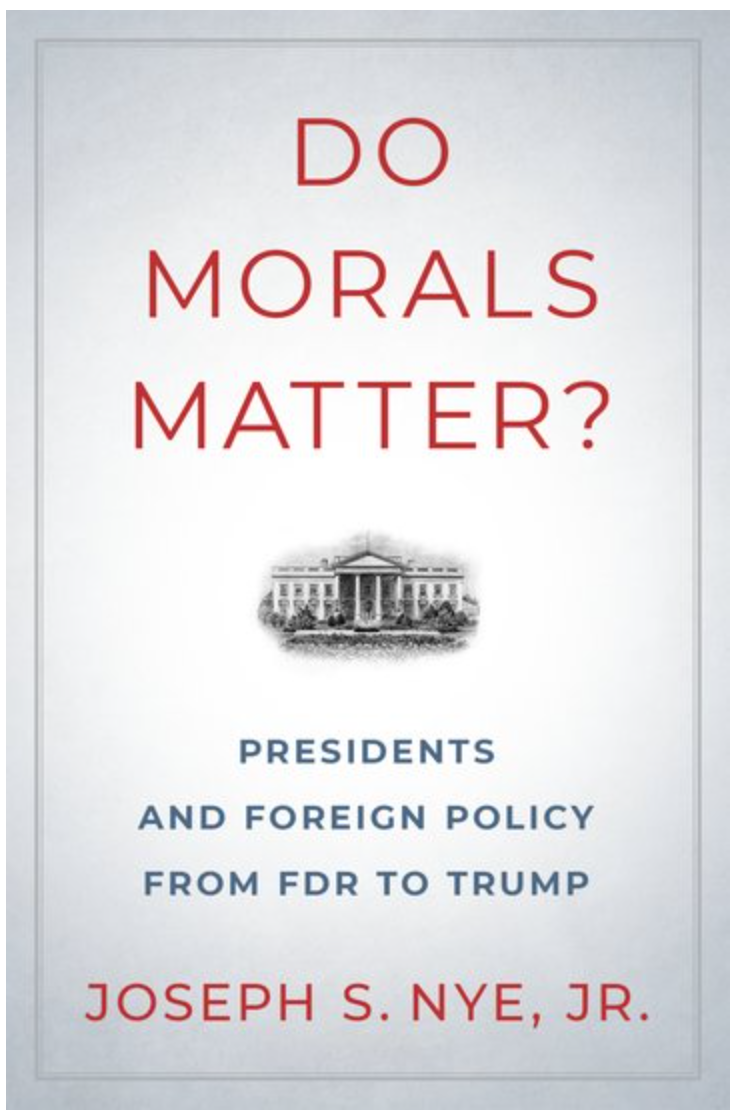[Joseph S. Nye. Do Morals Matter? Presidents and Foreign Policy from FDR to Trump.. Oxford University Press. New York, 2020. 254 pp]
review / Emili J. Blasco
 The question that serves as the degree scroll for the new book by Jospeh Nye, known to the general public for having coined the expression "the most important thing in the world". soft powerThe author's entrance is not a concession to secularized thinking, but rather a lack of boldness in asserting the importance of ethical reflection in foreign policy decisions, an importance that, despite the question mark, one senses is defended by the author.
The question that serves as the degree scroll for the new book by Jospeh Nye, known to the general public for having coined the expression "the most important thing in the world". soft powerThe author's entrance is not a concession to secularized thinking, but rather a lack of boldness in asserting the importance of ethical reflection in foreign policy decisions, an importance that, despite the question mark, one senses is defended by the author.
In fact, the question itself is a core topic in the discipline of international relations. A common approach is to see the world scenario as a conjunction of states that struggle against each other, in an anarchic dynamic where the law of the strongest prevails. Internally, the state may be driven by criteria of the common good, attending to the different needs of its inhabitants and making decisions at the national or local level through democratic processes. But beyond its own borders, does the legitimacy granted by its own voters not require the president to guarantee the security of its citizens against external threats and to safeguard the national interest against that of other states?
The fact that the state is the basic subject in international relations marks, of course, a dividing line between the two spheres. And therefore the question of whether the ethical discernment demanded of the leader in the domestic sphere should also be demanded of him in the foreign sphere is fully pertinent.
Only from extreme positions that consider that the state is a wolf for the state, applying the Hobbesian principle to international order (disorder) (and here there would be no supra-state to discipline this tendency of the state-individual), can it be defended that amorality governs all against all. On a lower rung is the so-called offensive realism and, on a lower rung, defensive realism.
Nye, a scholar of international relations, believes that realist theory is a good starting point for any president when defining a country's foreign policy, given that he must be guided especially by the ethics of responsibility, as he fulfills a "fiduciary role." "The first moral duty of a president is that of a trustee, and this begins with ensuring the survival and security of the democracy that elected him." But from this point on, the possibilities for international partnership and mutual benefit must also be explored, not closing the entrance to approaches of liberalism or cosmopolitanism.
"When survival is at stake, realism is a necessary basis for a moral foreign policy, though not sufficient," says Nye, for whom it is a "matter of Degree." "Since there is never perfect security, the moral question is what Degree of security should be assured before other values such as welfare, identity or rights become part of a president's foreign policy." He adds, "Many of the most difficult moral decisions are not all-or-nothing [...] The difficult moral decisions are in the middle. While it is important to be cautious about the dangers of a slippery slope, moral decisions rest on matching ends and means with each other." He concludes that "the maintenance of international institutions and regimes is part of moral leadership".
From the very beginning of the book, Nye uses the three conditions that have traditionally been used in moral treatises to judge an action as ethically good: that the intention, the means and the consequences are good at the same time.
Using these three yardsticks, the author analyzes the foreign policy of each of the U.S. presidents since World War II and establishes a final ranking that combines both the morality of their actions on the international scene and the effectiveness of their policies (because it is possible to have an ethical foreign policy that does little to further a country's national interests).
Thus, of the fourteen presidents, he considers that the four with the best grade in that combination are Roosevelt, Truman, Eisenhower and Bush I. In the middle he places Reagan, Kennedy, Ford, Carter, Clinton and Obama. And as the four worst he mentions Johnson, Nixon, Bush II and ("tentatively incomplete") Trump. Having made the ranking, Nye warns that he may have given precedence to the Democratic administrations for which he worked.
The book is a quick review of the foreign policy of each presidency, highlighting the presidents' doctrines, their successes and failures (as well as examining the ethical component), so it is also interesting as a succinct history of U.S. international relations over the past eighty years.
The aspect of morality perhaps lacks a greater academic foundation, since it is a discipline that has been especially studied since the scholastic era. But Nye's purpose was not to delve into this subject, but to offer a brief study of applied morality.
Reading Nye is always thought-provoking. Among other reflections he makes might be the idea of the new prospects that would have opened up for the world if particularly propitious times had coincided in the calendar. In particular, he suggests that if Brezhnev and his gerontocratic generation had left earlier and the USSR had also been beset by serious economic problems earlier, Gorbachev might have come to power coinciding with Carter's presidency; what they would have achieved together is, however, the realm of speculation.